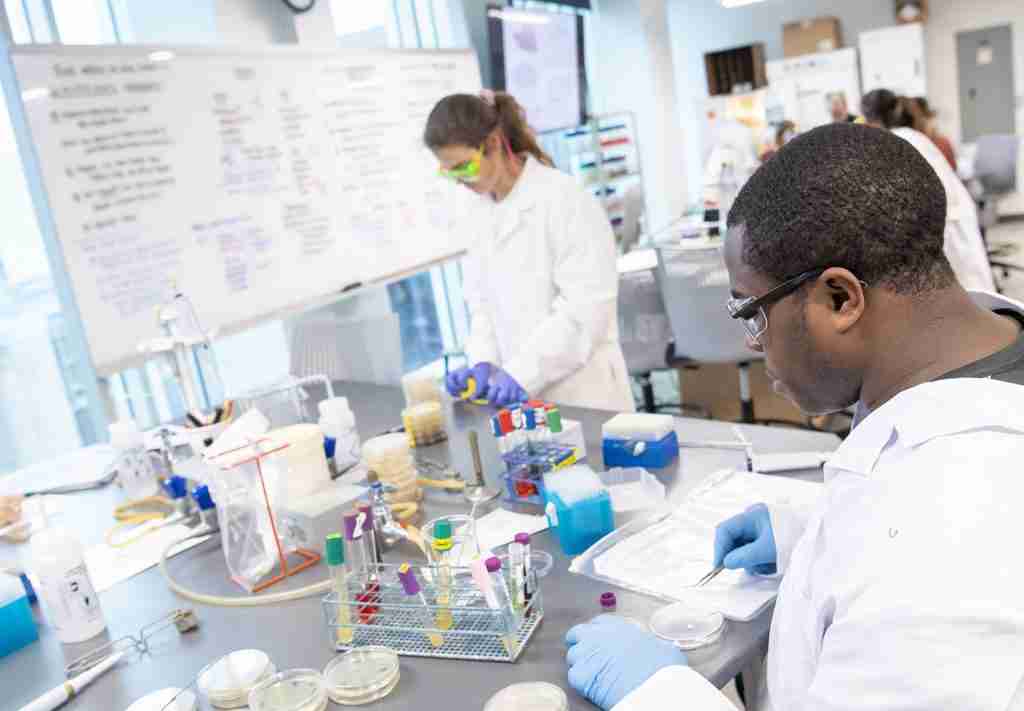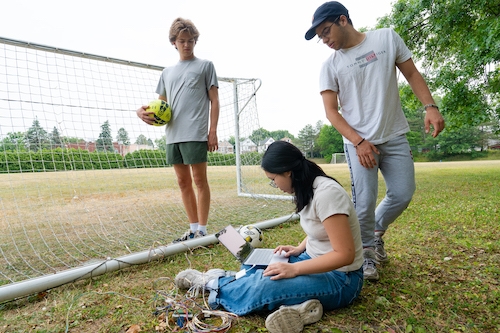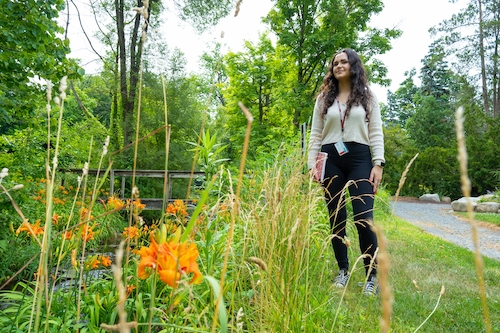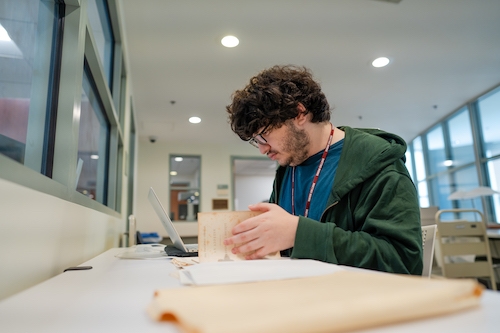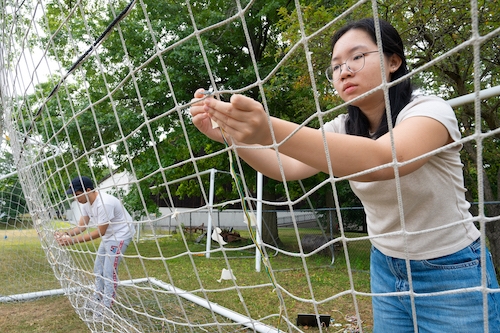On a hot, humid morning, Zaid Fafouri ’26 and Austin Gregory ’25 took turns kicking soccer balls into a net at Garis Field. Over the course of two hours, they repeated the routine hundreds of times.
Boom. Boom. Boom.
Crouched safely behind the net, Nguyen Ho ’26 collected data on her laptop from a series of sensors attached to the net. Each shot generates 1,800 pieces of data. After the final kick, they will retreat to a lab to analyze the data.
Led by Michael Okwori, the Mary H. ’80 and Richard K. Templeton ’80 assistant professor in Union’s Department of Electrical, Computer and Biomedical Engineering, the trio hopes to develop a smart soccer net system to help tell users where the ball has entered the net based on the net’s movement.
“This will be really useful for amateur footballers,” said Fafouri, from Casablanca, Morocco.
The three electrical engineering students are among 135 students from dozens of disciplines participating in paid research this summer. Most of the projects are funded by the college’s undergraduate research program. Government or scientific society grants to faculty members, academic departments and foundations fund the rest.
Since 1986, the College has fostered close working relationships between thousands of students and faculty during the summer as part of its long-standing commitment to undergraduate research.
“Our students work closely with faculty members in ways that are simply not possible during the semester,” said Matthew Anderson, who assumed the role of director of undergraduate research on July 1. He is also an assistant professor of computer science.
“This is research-intensive learning: our students learn the intricacies of research and study from their expert mentor and put this learning into practice.”
During a series of biweekly summer seminars, student researchers will present their work in elevator pitches, hear about innovative research and scholarship led by Union faculty, and participate in professional development activities led by the Office of Scholarships and Doctoral Pathways, the Writing Center, and the Data Analytics Center.
A poster session highlighting many of the summer projects will take place on Friday, August 2, from noon to 1:30 p.m., in the Wold Atrium.
On campus and beyond, students are immersed in a diverse mix of projects. Clare Reilly ’26, an art history and classics double major from Guilderland, N.Y., is one of two Evans Research Fellows in the College’s Special Collections and Archives.
Reilly studies the role of women in Union history Jackson’s Gardenthe oldest garden on an American college campus. She focuses on Marion Osgood Fox, the wife of Dixon Ryan Fox, president of the college from 1934 to 1945.
Marion took responsibility for the garden during her husband’s term as president.
An avid gardener, “she did a lot to renovate the gardens and gathered a community of other professors’ wives to help her,” Reilly said.
Reilly was thrilled to learn that part of Marion’s legacy included the discovery of the journals of Isaac Jackson, a graduate of the class of 1826 and professor of mathematics and natural philosophy who started the garden in the 1830s.
“The newspapers give us a valuable insight into the history of the garden,” Reilly said. She is advised by Stacie Raucci, the Frank Bailey Professor of Classics and chair of the department. “They have really changed since Jackson first broke ground. It took a lot of people over time to make the garden what it is today.”
Reilly plans to share her findings through a podcast that she hopes to launch in the coming weeks.
The other Evans Fellow is Robert Levitt ’26, a history major from Dobbs Ferry, New York. He is researching Eliphalet Nott, who was Union president for 62 years, the longest tenure of any American university president.
Her summer research is an extension of her second-year project, which primarily followed the aftermath of Nott’s death in 1866, with a particular focus on the board of trustees.
Levitt examines the College’s extensive archives on Nott and other sources to gain a comprehensive picture of the life of this extremely gifted orator.
“I plan on attending Union College for four years, so it would be helpful to know the history of the college,” Levitt said. His advisor is Kenneth Aslakson, associate professor of history.
Of Nott, Levitt said he was an “authoritarian figure who some said ruled with an iron fist. He was the arbiter of everything.”
The two Evans Fellows are assisted by Joseph Lueck, Special Collections Reference and Outreach Archivist.
Daniel Singer, Class of 2025, works with a team of students in a chemistry lab in the Integrated Science and Engineering Complex. Their goal is to make copper complexes that have biological applications. Singer’s role focuses on the synthesis of the complexes.
“We have made pyridine Schiff base ligands (the organic structure attached to the metal center) and are moving toward making azoles, which are cyclic analogs of the previous ligands with the addition of a heteroatom,” Singer said.
“These ligands, when coordinated to copper, are likely to have a significant biological effect, but they add increased complexity to their synthesis. We are working to develop a highly efficient methodology for the synthesis of these ligands. We are also studying the stability of these ligands when coordinated to transition metals, as we have observed evidence of unusual hydrolysis.”
Other students in the lab are Kennedy Alexis ’24, Abigail Bowman ’23, Alex Erickson ’25, Owen Smith ’25 and Paige Tromblee ’25. The lab is under the direction of Laurie Tyler, professor of chemistry, and Colleen Connelly, assistant professor of chemistry.
These are just a few examples of the research being conducted at the Union during the summer. Throughout the summer, the College will be presenting a number of projects. Return to the site news site to learn more.
“The summer research program is an opportunity for our students to delve deeper into a research project, trying to learn something they don’t know, maybe something no one on Earth knows,” Anderson said.
“This type of experience allows students to apply what they learn in the classroom to the real world, build an invaluable portfolio of work and skills for future careers in the workforce or academia, and prepare them for lifelong learning.”

